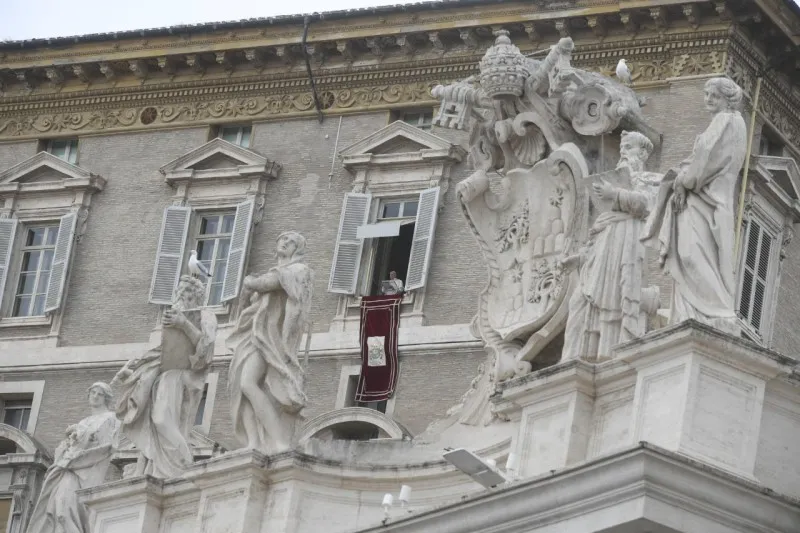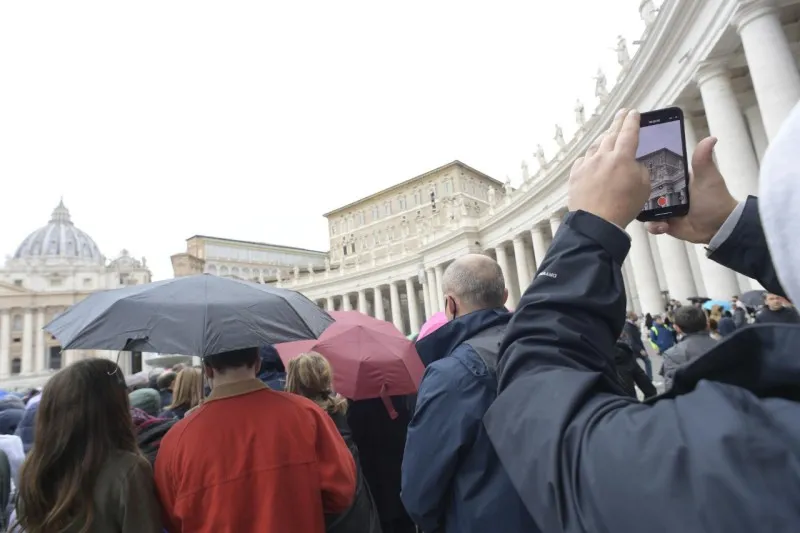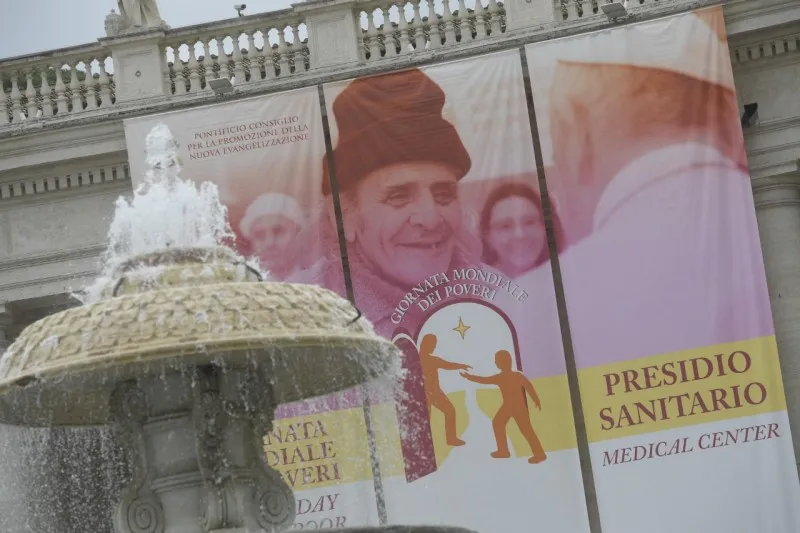
Vatican City, Nov 14, 2021 / 07:00 am (CNA).
When one is faced with an important difficult decision, Pope Francis’ advice is to imagine standing before Christ at the “threshold of eternity” because that is what ultimately matters.
Speaking from the window of the Apostolic Palace to pilgrims gathered in St. Peter’s Square below, the pope urged people to reflect on whether their time is spent focusing on things that are transitory or in “the ultimate things that remain.”
“Brothers and sisters, let us ask ourselves: what are we investing our lives in? On things that pass, such as money, success, appearance, physical well-being? … When our time comes … we have to leave everything behind,” Pope Francis said in his Angelus address on Nov. 14.
“The Word of God warns us today: This world will pass away and only love will remain,” he said.
Pope Francis recalled Jesus’ parable in which he warned not to build one’s life on sand, but to lay a solid, deep foundation on rock.
“According to Jesus, the faithful disciple is the one who founds his life on the rock, which is his Word (cf. Mt 7:24-27), which does not pass away, on the firmness of the Word of Jesus: this is the foundation of the life that Jesus wants from us, and which will not pass away,” the pope said.

“Those who do good are investing in eternity,” he said.
“When we see a person who is generous and helpful, meek, patient, who is not envious, does not gossip, does not brag, is not puffed-up with pride, does not lack respect (cf. 1 Cor 13:4-7), this is a person who builds Heaven on earth.”
Those who do good may not make headlines or receive any recognition for their good efforts, the pope acknowledged, but he underscored that “what they do will not be lost because good is never lost. Good lasts forever.”

“Here then is some advice for making important choices,” Pope Francis said.
“When one does not know what to do, how to make a definitive choice, an important decision, a decision that involves Jesus’ love … before deciding, let us imagine that we are standing in front of Jesus, as at the end of life, before Him who is love.”
“And imagining ourselves there, in His presence, at the threshold of eternity, we make the decision for today. We must decide in this way: always looking to eternity, looking at Jesus. It may not be the easiest, it may not be the most immediate, but it will be the right one, that is sure,” he said.
At the end of his Angelus address, Pope Francis reminded the crowd that the Church is celebrating the World Day of the Poor this year with the theme: “The poor you will always have with you.”
He said: “And it is true: humanity progresses, develops, but the poor are always with us. There are always the poor, and in them Christ is present. Christ is present in the poor.”
The pope offered a Mass for the World Day of the Poor earlier in the day in the presence of 2,000 people living in poverty and the volunteers who assist them, according to the Vatican.

“The cry of the poor, united with the cry of the Earth, resounded in recent days at the United Nations Climate Change Summit COP26 in Glasgow,” Pope Francis said in the Angelus.
“I encourage all those with political and economic responsibilities to act now with courage and vision; at the same time, I invite all people of good will to exercise active citizenship for the care of the common home.”
Pope Francis noted that he was also praying for people with diabetes and those who care for them on World Diabetes Day.
“To base one’s life on the Word of God … is not an escape from history, but an immersion into earthly realities in order to make them solid, to transform them with love, imprinting on them the sign of eternity, the sign of God,” Pope Francis said.
“May Our Lady help us to make the important choices in life as she did: according to love, according to God,” he said.
If you value the news and views Catholic World Report provides, please consider donating to support our efforts. Your contribution will help us continue to make CWR available to all readers worldwide for free, without a subscription. Thank you for your generosity!
Click here for more information on donating to CWR. Click here to sign up for our newsletter.




We read: “When one does not know what to do, how to make a definitive choice, an important decision, a decision that involves Jesus’ love … before deciding, let us imagine that we are standing in front of Jesus, as at the end of life, before Him who is love.”
Yes. But adding to this insight, is there also a prior insight and responsibility? Our uncertainties about charitable “decisions,” are they often and first about practical “judgments”—by informed conscience oriented in freedom toward the truth?
“[C]onscience expresses itself in acts of ‘judgment’ [not autonomous ‘decisions’] which reflect the truth about the good [….] The Commandment of love of God and neighbor does not have in its dynamic any higher limit [with Francis], but it does have a lower limit, beneath which the commandment is broken” (Veritatis Splendor, nn. 63, 52).
Enabling someone in their dysfunction requires a sufficient degree of knowledge of that person. A lower limit to charity proposed by John Paul II identifies deficiency of proportion for exercise of a moral virtue, not the withholding due to knowledge that would make a proposed act of charity an excess when knowingly enabling. Pope Francis’ refers to a different situation, often a predicament that he previously gave example, of a person obviously intoxicated asking for money. Francis’ argument was the correct one. If we don’t know what the person will do, buy a drink or pay for a room for the night we should still give [although Francis went beyond and said perhaps a drink is all that the man had in life]. We can always ask, which I’ve done on similar occasions. For a living example, I was once approached out of the shadows on a deserted subway platform by a hulking man with a terribly scared face asking for a handout. He was drunk. I said I would help him if he didn’t go off and buy liquor, that for his own sake I was reluctant. He broke down in tears and expressed remorse for his life. I gave him what I could afford with the gentle condition he use it for a good. He thanked me. We can’t make a moral judgment using the formula of lower limit in such circumstances. Charity demands on occasions as described that we give to whoever asks.
I hear you, but still wonder whether the message is that the floor of morality does not exist in concrete cases. The silence is deafening as in no response to the dubia. Pope Francis, it seems sometimes, not only “refers to a different situation,” but signals that such is the only situation.
Yes. That’s the key difference. Virtue absent of the discrimination required to remain virtue.
On Justice. Justice which incorporates all the virtues unlike other virtues is not subject to excess or defect. It finds its specificity in a definitive act that is either just or unjust. For example, if agreed wages are discretionarily reduced rather than by necessity that’s an injustice. A degree of partial payment cannot be justified by its proximity to the mean [the agreed salary]. Similarly a man cannot share his conjugal intimacy with another woman however limited in comparison to the fidelity owed to his wife.